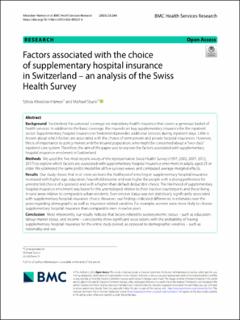Please use this identifier to cite or link to this item:
https://doi.org/10.21256/zhaw-27400Full metadata record
| DC Field | Value | Language |
|---|---|---|
| dc.contributor.author | Altwicker-Hámori, Szilvia | - |
| dc.contributor.author | Stucki, Michael | - |
| dc.date.accessioned | 2023-03-20T14:42:50Z | - |
| dc.date.available | 2023-03-20T14:42:50Z | - |
| dc.date.issued | 2023-03-16 | - |
| dc.identifier.issn | 1472-6963 | de_CH |
| dc.identifier.uri | https://digitalcollection.zhaw.ch/handle/11475/27400 | - |
| dc.description.abstract | Background: Switzerland has universal coverage via mandatory health insurance that covers a generous basket of health services. In addition to the basic coverage, the insured can buy supplementary insurance for the inpatient sector. Supplementary hospital insurance in Switzerland provides additional services during inpatient stays. Little is known about which factors are associated with the choice of semi-private and private hospital insurances. However, this is of importance to policy makers and the insured population, who might be concerned about a “two-class” inpatient care system. Therefore, the aim of the paper was to explore the factors associated with supplementary hospital insurance enrolment in Switzerland. Methods: We used the five most recent waves of the representative Swiss Health Survey (1997, 2002, 2007, 2012, 2017) to explore which factors are associated with supplementary hospital insurance enrolment in adults aged 25 or older. We estimated the same probit model for all five surveys waves and computed average marginal effects. Results: Our study shows that in all cross-sections the likelihood of enrolling in supplementary hospital insurance increased with higher age, education, household income and was higher for people with a strong preference for unrestricted choice of a specialist and with a higher-than-default deductible choice. The likelihood of supplementary hospital insurance enrolment was lower for the unemployed relative to their inactive counterparts and those living in rural areas relative to comparable urban residents. Ever-smoker status was not statistically significantly associated with supplementary hospital insurance choice. However, our findings indicated differences in estimates over the years regarding demographic as well as insurance-related variables. For example, women were more likely to choose supplementary hospital insurance than comparable men in earlier years. Conclusion: Most importantly, our results indicate that factors related to socioeconomic status – such as education, labour market status, and income – consistently show significant associations with the probability of having supplementary hospital insurance for the entire study period, as opposed to demographic variables – such as nationality and sex. | de_CH |
| dc.language.iso | en | de_CH |
| dc.publisher | BioMed Central | de_CH |
| dc.relation.ispartof | BMC Health Services Research | de_CH |
| dc.rights | https://creativecommons.org/licenses/by/4.0/ | de_CH |
| dc.subject | Supplementary hospital insurance | de_CH |
| dc.subject | Swiss Health Survey | de_CH |
| dc.subject | Probit | de_CH |
| dc.subject | Inpatient care | de_CH |
| dc.subject | Switzerland | de_CH |
| dc.subject.ddc | 360: Soziale Probleme und Sozialversicherungen | de_CH |
| dc.title | Factors associated with the choice of supplementary hospital insurance in Switzerland : an analysis of the Swiss Health Survey | de_CH |
| dc.type | Beitrag in wissenschaftlicher Zeitschrift | de_CH |
| dcterms.type | Text | de_CH |
| zhaw.departement | Gesundheit | de_CH |
| zhaw.departement | School of Management and Law | de_CH |
| zhaw.organisationalunit | Institut für Public Health (IPH) | de_CH |
| zhaw.organisationalunit | Winterthurer Institut für Gesundheitsökonomie (WIG) | de_CH |
| dc.identifier.doi | 10.1186/s12913-023-09221-0 | de_CH |
| dc.identifier.doi | 10.21256/zhaw-27400 | - |
| zhaw.funding.eu | No | de_CH |
| zhaw.issue | 246 | de_CH |
| zhaw.originated.zhaw | Yes | de_CH |
| zhaw.publication.status | publishedVersion | de_CH |
| zhaw.volume | 23 | de_CH |
| zhaw.publication.review | Peer review (Publikation) | de_CH |
| zhaw.webfeed | G: Arbeit und Gesundheit | de_CH |
| zhaw.author.additional | No | de_CH |
| zhaw.display.portrait | Yes | de_CH |
| zhaw.monitoring.costperiod | 2023 | de_CH |
| Appears in collections: | Publikationen Gesundheit Publikationen School of Management and Law | |
Files in This Item:
| File | Description | Size | Format | |
|---|---|---|---|---|
| 2023_AltwickerHamori-Stucki_Supplementary-hospital-insurance-choice-CH.pdf | 1.23 MB | Adobe PDF |  View/Open |
Show simple item record
Altwicker-Hámori, S., & Stucki, M. (2023). Factors associated with the choice of supplementary hospital insurance in Switzerland : an analysis of the Swiss Health Survey. BMC Health Services Research, 23(246). https://doi.org/10.1186/s12913-023-09221-0
Altwicker-Hámori, S. and Stucki, M. (2023) ‘Factors associated with the choice of supplementary hospital insurance in Switzerland : an analysis of the Swiss Health Survey’, BMC Health Services Research, 23(246). Available at: https://doi.org/10.1186/s12913-023-09221-0.
S. Altwicker-Hámori and M. Stucki, “Factors associated with the choice of supplementary hospital insurance in Switzerland : an analysis of the Swiss Health Survey,” BMC Health Services Research, vol. 23, no. 246, Mar. 2023, doi: 10.1186/s12913-023-09221-0.
ALTWICKER-HÁMORI, Szilvia und Michael STUCKI, 2023. Factors associated with the choice of supplementary hospital insurance in Switzerland : an analysis of the Swiss Health Survey. BMC Health Services Research. 16 März 2023. Bd. 23, Nr. 246. DOI 10.1186/s12913-023-09221-0
Altwicker-Hámori, Szilvia, and Michael Stucki. 2023. “Factors Associated with the Choice of Supplementary Hospital Insurance in Switzerland : An Analysis of the Swiss Health Survey.” BMC Health Services Research 23 (246). https://doi.org/10.1186/s12913-023-09221-0.
Altwicker-Hámori, Szilvia, and Michael Stucki. “Factors Associated with the Choice of Supplementary Hospital Insurance in Switzerland : An Analysis of the Swiss Health Survey.” BMC Health Services Research, vol. 23, no. 246, Mar. 2023, https://doi.org/10.1186/s12913-023-09221-0.
Items in DSpace are protected by copyright, with all rights reserved, unless otherwise indicated.